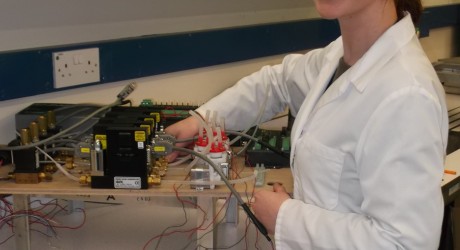SCOTTISH livestock producers are set to benefit from research being undertaken by four PhD students working on new projects which, if successful, could lead to improved industry efficiency and sustainability.
The projects to be carried out by the students will focus on grassland management, animal health and meat quality. Three of the projects are co-funded by Quality Meat Scotland (QMS), EBLEX and HCC, and one project is co-funded by the University of Strathclyde and QMS.
Good grassland management is becoming increasingly important as the ability of grassland to store carbon becomes more widely recognised.
This is particularly important to farmers who have grass-based production systems. It is well known that carbon is stored in the soil, but there is very little understanding of how grass management affects this process.
Lucy Marum of the James Hutton Institute and Aberdeen University will be working on grassland management for her three-year QMS, EBLEX and HCC co-funded project.
She will undertake studies which aim to answer the question of whether grazing can be managed to increase the amount of carbon retained in soil in the long term.
Her project work will be carried out on upland grassland soils and aims to look at the types of management practices and activities in grassland systems that can potentially influence and alter carbon storage.
The types of activity that may be considered include changes in stocking levels, fertilizer inputs and the timing of application.
Ms Marum will use a range of analytical approaches to try to establish the impact of different management strategies on carbon cycling at these sites.
Begins a spokesperson: “It is hoped the project will help provide practical evidence-based advice which farmers can use to help them protect soil carbon and optimise carbon storage as part of their management approaches in upland grazings.
“Maintaining animal health is a key element of livestock farming. Digital dermatitis is an infectious bacterial disease which affects the feet of ruminants and causes lameness and loss of productivity.
“It was first identified in the UK in 1987, and it is now estimated that at least 70 per cent of UK herds are affected. There is no single effective treatment, and the way in which the disease is transmitted is unknown.”
Leigh Sullivan of University of Liverpool will spend her three-year QMS, EBLEX and HCC co-funded project working to identify the specific environmental risk factors which may increase the risk of digital dermatitis levels in cattle and sheep. She will also identify the main reservoirs of infection and explore the way in which the immune systems of cattle respond to infection.
The information produced from this project will help cattle and sheep farmers use better preventative measures and reduce the burden of this disease on farm, helping them to save time and money.
The increasing incidence of worms that are resistant to wormers is a concern and there is an urgent need for new control methods.
The work that Henry Gu of University of Glasgow will be carrying out in his three year QMS, EBLEX and HCC co-funded project will explore some possible routes to developing new control method for Haemonchus contortus.
Haemonchus contortus is a stomach worm – a blood sucker which can lead to anaemia, poor growth and can ultimately cause the death of the livestock. The worms produce secretions and Mr Gu will investigate whether these substances interact with the host immune system to regulate the development of immunity.
Protective immunity to the worms takes time to develop in the animal and substances released by the worms may influence the development of immunity. It is hoped Mr Gu’s work will make progress toward the development of new ways to control worms and new methods to optimise vaccination.
The QMS and Scottish Government IMEQ project developing approaches towards integrated measurement of eating quality at line speed in the abattoir finishes in March 2013. As part of the on-going developments to progress the IMEQ project towards implementation, QMS is co-funding a student with the University of Strathclyde.
Tong Qiao will be carrying out work to develop Hyperspectral Imaging Technologies for use on beef and lamb in her three year project. She will be exploring aspects of the technology which will allow the approach to be integrated into the line to improve the quality of data collected.
More importantly, she will also develop the complex analysis that is required to interpret the data collected by the imaging technique so that prediction of meat quality according to key criteria including tenderness can be achieved automatically.
These machine learning based approaches also have the potential to provide valuable indicators to grade meat products in a quantitative and subjective way, leading to an innovative solution for these areas.
Professor Charlotte Maltin, science and innovation manager with Quality Meat Scotland, said: “These four students are all undertaking projects which should provide important new information to help farmers improve the efficiency and sustainability of their businesses.”
Caption: Lucy Marum, one of the four PhD students, who will focus on grassland management.
MEDIA RELEASE posted by QMS. You too can post media releases (aka press releases) on allmediascotland.com. For more information, email here.
Contact: Claire Morrison
Phone: 01314724046
Email: cmorrison@qmscotland.co.uk
Website: http://www.qmscotland.co.uk






